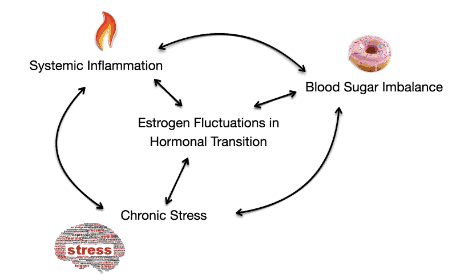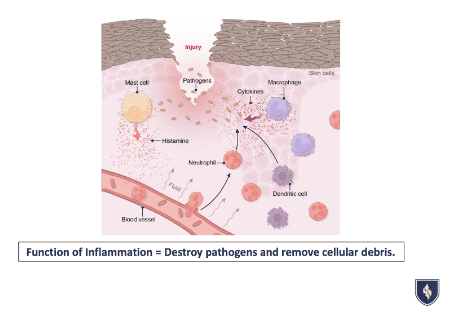While working with perimenopausal and menopausal women, I have come to realize that this normal hormonal transition is becoming more dysfunctional and challenging to navigate. Minor changes in sleep, weight, mood, and energy are normal at this time, but I am seeing women with debilitating fatigue, sleep disorders, significant weight gain, and cognitive changes. What is making this transition so difficult? And why is this becoming the norm rather than the exception?
I believe three main metabolic conditions negatively influence midlife hormonal transitions: systemic inflammation, blood sugar imbalances, and chronic stress (I call them the Three Thugs of Health). This is not surprising as these factors are underlying most chronic diseases we see in our modern world, but these aspects of your metabolism become magnified as reproductive hormones rebalance during perimenopause, menopause, and beyond.
Inflammation, blood sugar dysregulation, stress, and estrogen influence one another. For instance, blood sugar irregularities, common in our modern lifestyle, are very stressful on the body and emotionally triggering. The blood sugar imbalance is also an inflammatory risk factor, an additional stressor on the body. Estrogen helps to keep all three under check before perimenopause, but as hormone levels fluctuate, all three of the Thugs get wound up and exacerbate normal perimenopausal discomforts.
I have learned that by supporting these health factors, you can significantly reduce hormonal symptoms that take place during perimenopause and menopause.
These are complex issues, and I do not want to shortchange any of them, so I will concentrate on perimenopause inflammation in this post. Systemic inflammation is the most influential factor of all three and deserves the front-row spot. I will cover blood sugar balance (hyperglycemia and hypoglycemia) and chronic stress in future articles.
What is inflammation, and why is it influential during life stage transitions?
Inflammation is good for you…when you need it. In an acute injury or infection, inflammation is your body’s way of protecting you with powerful chemicals and metabolic tactics that will heal the cut or kill the bad guys. Sometimes, it hurts. Inflammation allows fluid into the area to make it swollen and red. It sends powerful biochemicals called cytokines to the area, which can leave collateral damage to the surrounding tissue, causing pain. But this is an “as needed” bodily response to an environmental threat with a definite beginning and end.
Inflammation becomes a “Thug” when it is systemic and chronic. This type of inflammation is more of a simmer than an all-out attack and can become self-perpetuating. Most medical experts agree that systemic inflammation is underlying all chronic health conditions affecting women over 50, including cardiovascular disease, cognitive decline, autoimmunity, digestive dysfunction, and cancer. Reducing inflammation is one of the most effective ways to have optimal health as we age. For women undergoing hormonal transitions, systemic perimenopause inflammation becomes elevated from a simmer to a raging brush fire. The increase is due to the disrupted estrogen levels during the transition of hormone production from the ovaries to the adrenal glands. Perimenopause and menopause cause both acute and systemic inflammation as well as exacerbate prior levels of inflammation.
There are seven pathways drive chronic inflammation, but it is easiest to think of them in two main categories: metabolic and immune. Different events cause each type of inflammation, and each type uses various methods to reduce it.If you have immune-driven inflammation, such as allergies and skin issues, but you take a supplement that treats metabolic inflammation, such as omega-3 fatty acid supplements, you won’t see any improvement. To treat immune-driven inflammation, an antihistamine would be more effective. Likewise, metabolic inflammation cannot be resolved with treatments for immune-driven inflammation, such as antihistamines Determining the type of inflammation is the first step in supporting the issue.
Metabolic Inflammation and Perimenopause…the main culprit…your fat cells!
Weight gain is typical during hormonal transition. Adipocytes (fat cells) are more than just storage compartments; they are endocrine organs secreting hormones and immune chemicals. When your estrogen production is transitioning from your ovaries to your adrenal glands, your levels can fluctuate, so your body looks for alternative sources of estrogen. Those extra 10 pounds magically appearing around your middle are your body’s temporary answer to the problem. Abdominal fat cells can produce supplemental estrogen when needed. Your body increases the size of your abdominal fat cells to produce more estrogen; however, abdominal fat is the most inflammatory, so your inflammation levels rise.
To make matters worse, if you started your transition with a few extra pounds or blood sugar irregularities, this strategy could backfire and cause an increase in inflammatory chemicals, such as free radicals, prostaglandins, and cytokines released from the extra fat tissue. Estrogen fluctuations can also cause insulin surges, increasing adipocyte storage and weight gain. This fast-forward process can be challenging to stop, and inflammation increases even more.
Immune Driven Inflammation and Perimenopause…burn baby burn!
The immune system drives the second category of inflammation production. If you are prone to allergies, food sensitivities, skin issues, and difficulty with infections, then this may be the type of systemic inflammation you may be experiencing. An aging immune system is another factor, creating less efficiency in immune processes.
If you have any inflammatory conditions before you begin your hormonal changes, the estrogen fluctuations during perimenopause will increase all of the symptoms associated with these conditions. Many of the symptoms will coincide with the usual perimenopausal symptoms of sleep disturbance, mood alterations, and fatigue, making your hormonal shift pretty miserable.
Okay…so what can we do about this?
Systemic inflammation is a pervasive issue in our modern world. Still, some lifestyle changes can reduce perimenopause inflammation and support a more comfortable hormonal transition.
- Practice Sleep Hygiene – sufficient, quality sleep is a vital inflammation mediator.
-
- Go to bed and wake at the same time each day…7 days per week
-
- Turn off blue light devices before bed or get blue light-blocking glasses
-
- Sleep in a darkened, cool room
-
- Reduce food and alcohol before bed
- Eat an anti-inflammatory diet – processed foods containing added sugars and bad fats promote weight gain and cellular damage.
-
- Avoid or significantly reduce added sugars, processed flour products, and snacks.
-
- Avoid processed seed oils and fried foods.
-
- Include plenty of healthy fats such as olive oil, coconut oil, butter, avocados, and nuts and seeds.
-
- Eat plenty of fresh fruits and veggies, rich in all the colors of the rainbow. Add a salad to the beginning of each meal, even breakfast.
- Exercise in a manner that supports your body – both inactivity and overtraining will cause inflammation
-
- Move naturally every day…walk or bike to the store, garden, dance around the house.
-
- Practice a variety of exercise…weight training, stretching, and cardiovascular.
-
- Do what you enjoy so you will continue to do it!
- Practice Stress resiliency – the Vagus nerves are a major inflammation modulator and promote ‘rest and digest’ over ‘fight or flight.’
- The number one way to support the Vagus nerves is to do consistent and daily breathwork.
- Try belly breathing before each meal: Inhale for four counts, feeling your belly expand. Hold for six counts, and exhale for eight to ten counts. Do all of this through the nose, three to five rounds before your meal.
- Support a Healthy Microbiome – the bacteria in your gut regulate 85% of your immune system.
- Eat fermented vegetable foods like sauerkraut.
- Eat plenty of vegetable fiber…feeds the good bacteria and starves out the bad guys.
- Be careful with your probiotic choice…not all of them are good guys.
Lifestyle choices can balance inflammation. Contact me for more ideas, or if you need nutritional guidance through this hormonal transition. Stay tuned for my next post, which will be on Blood Sugar Regulation and how it supports a happy, healthy, and comfortable perimenopause.



